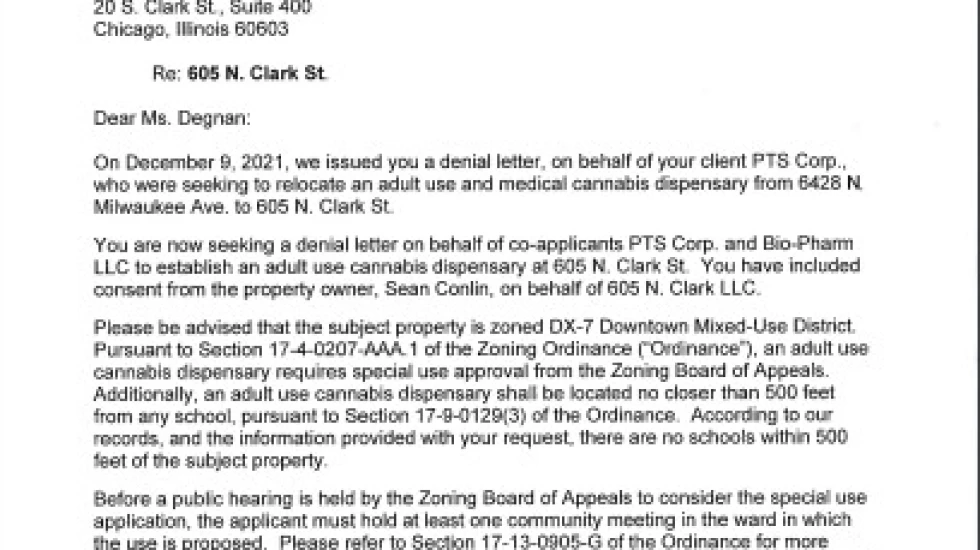
A clout-heavy pot firm’s bid to open a dispensary at the site of the old Rainforest Cafe now hinges on its partnership with a startup led by the white chief executive of a major moving company who scored a social equity license based on a decades-old weed arrest.
Those details emerged during a contentious community meeting Tuesday night at Maggiano’s Banquets in River North, where residents and advocates peppered officials from the two companies with questions about safety and security, the close proximity to multiple existing pot shops and their social equity bonafides.
“Between the casino discussions and four dispensaries in the neighborhood, you don’t have to project too far to understand what the future looks,” one resident said derisively after the meeting, which another described as a “trainwreck.”
The meeting marks the latest stumbling block for Progressive Treatment Solutions, or PTS, a company with deep ties to city government that initially sought to move its dual-use Consume dispensary from Jefferson Park to the colorful building that previously housed the Rainforest Cafe at 605 N. Clark St.
PTS eventually conceded that plan was illegal under state law and partnered with Bio-Pharm, which scored a license to run a recreational dispensary in a state-run lottery. Like other new permits, Bio-Pharm’s was prioritized to so-called social equity applicants in an effort to diversify the state’s lily white cannabis industry.

Pressed on how the company qualified for that special status, Bio-Pharm’s Chief Operating Officer Kevin Munroe told the crowd in hushed tones that his father, Michael F. Munroe Jr., had a cannabis-related arrest from the 1970s. Michael F. Munroe Jr. is Bio-Pharm’s majority owner and the CEO of Pickens-Kane, which touts itself as “the largest commercial relocation company” in Illinois.
Under state law, those seeking cannabis licenses can become social equity applicants by meeting certain criteria, including having an arrest or conviction for certain weed offenses. But social equity advocates have long lambasted firms they believe have gamed a system meant to benefit people of color, who have been disproportionately impacted by cannabis enforcement.
Members of Ex-Cons for Community and Social Change, a community organization that has demonstrated outside weed stores, brought those issues to the fore Tuesday.
“This flower weed, cannabis that you call it now, created mass incarceration in our community, where 99.9% of white men own dispensaries. Not white women either,” said executive director Tyrone Muhammad. “They talk social equity, but the very guys [whose] bodies was victimized by the war on drugs is never sitting at them tables.”
A spokesperson for PTS said both firms involved in the Rainforest Cafe bid have minority owners. And PTS CEO Terry Peterson, the most high-profile black cannabis executive in the state, noted in the meeting that he has considerable equity in the company.
Peterson, a former 17th Ward alderman who held various high-ranking positions in city government, said PTS intends to continue partnering with social equity players and opened the door to working with organizations like ECCSC.
During a presentation, he said PTS and Bio-Pharm are planning to revamp the building’s “bold design,” replacing the giant mushrooms and rainforest paintings with a “graffiti-proof” exterior and LED lighting features. He estimated the upgrades will cost between $7 to $10 million, saying the store could open next year.

The company plans to remain open from 9 a.m. to 9 p.m. every day, with armed security guards remaining at the store around the clock. Ed Ferrell, owner of Silver Star Protection Group, the firm hired to guard the store, said his team will also coordinate with police agencies and the city’s Office of Emergency Management and Communications, giving them access to store security cameras.
Pressed on why the company wants to open in area that’s already filled with dispensaries, Peterson said it’s a “vibrant community” that would benefit from more competition and another neighbor with significant security.
PTS and Bio-Pharm can now go before the Zoning Board of Appeals to seek the required special-use zoning approval needed to set up shop. However, the companies still don’t technically have a state dispensary license to start operating.
That permit is being held up by a Cook County judge’s order, along with 184 others. Although lawsuits have long stymied the licensing process, Peterson said he was hopeful the issues would be resolved as soon as next month.
“We need to get these licenses released so that the social equity applicants can start to open up, scale and operate their dispensaries,” he said.







